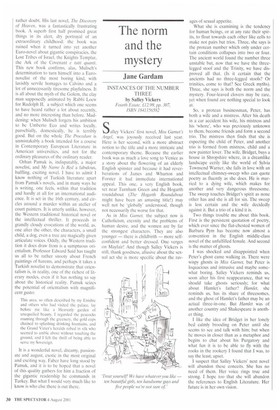The norm and the mystery
Jane Gardam
INSTANCES OF THE NUMBER THREE by Salley Vickers Fourth Estate. £12.99, pp. 307, ISBN 1841156582 Salley Vickers' first novel, Miss Garnet's Angel. was joyously received last year. Here is her second, with a more abstract notion to the title and a more intricate and contemporary theme. Because the earlier book was as much a love song to Venice as a story about the flowering of an elderly English spinster and because it had reverberations of James and Wharton and Forster it had immediate international appeal. This one, a very English book, set near Turnham Green and the Hogarth roundabout (The Hogarth Roundabout might have been an amusing title!) may well not he 'globally' understood, though not necessarily the worse for that.
As in Miss Garnet, the subject now is Catholicism, eternity and the problems of human desire, and the women are by far the strongest characters. They are also younger — there is childbirth — more selfconfident and better dressed. One verges on Mayfair! And though Salley Vickers is still, thank goodness, allusive about the sexual act she is more specific about the ray ages of sexual appetite.
What she is examining is the tendency for human beings, or at any rate their spirits, to float towards each other like cells to make not pairs but trios. Three, she says is the protean number which only under certain conditions collapses into two or four. The ancient world found the number three unstable but, now that we have the threelegged stool and the Trinity, we have disproved all that. (Is it certain that the ancients had no three-legged stools? Or trinities, come to that? See Greek myths). Three, she says is both the norm and the mystery. Four-leaved clovers may be rare, yet when found are nothing special to look at.
So, a protean businessman, Peter, has both a wife and a mistress. After his death in a car accident his wife, his mistress and his 'whore', who was previously unknown to them, become friends and form a second trio. The mistress then finds that she is expecting the child of Peter, and another trio is formed from mistress, child and a new painter lover. The wife, Bridget, buys a house in Shropshire where, in a dreamlike landscape eerily like the world of Sylvia Townsend Warner, she falls in love with an intellectual chimney-sweep who can quote poetry as fluently as she does. He is married to a dying wife, which makes for another and very dangerous threesome. The sweep touches Bridget's spirit as none other has and she is all for sin. The sweep is less certain and the wife decidedly against it. But a trio of a kind it is.
Two things trouble me about this book. First is the persistent quotation of poetry, which ever since the flat-chested women of Barbara Pym has become now almost a convention in the English middle-class novel of the unfulfilled female. And second is the matter of ghosts.
I was shocked and disappointed when Peter's ghost came walking in. There were wispy ghosts in Miss Garnet, but Peter is loquacious and intrusive and maybe somewhat boring. Salley Vickers reminds us, soon after his first reappearance, that we should take ghosts seriously; for what about Hamlet's father? Hamlet, she reminds us, has its share of threesomes, and the ghost of Hamlet's father may be an actual three-in-one. But Hamlet was of another country and Shakespeare is another thing.
I like the idea of Bridget in her lonely bed calmly brooding on Peter until she seems to see and talk with him; but when he moves in closer than as a metaphor and begins to chat about his Purgatory and what fun it is to be able to fly with the rooks in the rookery I found that I was, to say the least, upset.
I suspect that Salley Vickers' next novel will abandon these conceits. She has no need of them. Her voice rings true and strong. I hope too that she will abandon the references to English Literature. Her future is in her own vision.


























































 Previous page
Previous page